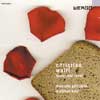Wolff Bread and Roses
Kaul and Goldstein fill in the gaps but still leave plenty for the listener to discover
View record and artist detailsRecord and Artist Details
Composer or Director: Christian Wolff
Genre:
Vocal
Label: Wergo
Magazine Review Date: 3/2004
Media Format: CD or Download
Media Runtime: 75
Mastering:
Stereo
DDD
Catalogue Number: WER6658-2

Tracks:
| Composition | Artist Credit |
|---|---|
| For 1, 2 or 3 People |
Christian Wolff, Composer
Christian Wolff, Composer Malcolm Goldstein, Violin Matthias Kaul, Percussion |
| Bread and roses |
Christian Wolff, Composer
Christian Wolff, Composer Malcolm Goldstein, Violin |
| Edges |
Christian Wolff, Composer
Christian Wolff, Composer Malcolm Goldstein, Violin Matthias Kaul, Percussion |
| (2) Snare Drum Peace Marches, Movement: No 2 |
Christian Wolff, Composer
Christian Wolff, Composer Matthias Kaul, Percussion |
Author: kYlzrO1BaC7A
‘Dependency and ‘Freedom’ – watchwords central to music-making of the kind that Christian Wolff envisages in For 1, 2 or 3 People (1964). This is music which places huge demands on a performer’s mental agility and emotional self-control, the detailed instructions determining playing attitude rather than performance practice. From among the 10 sections – scored ‘for any instruments’ – ‘II’ combines voice and the aural dismantling of a hurdy-gurdy, with ‘VI’ a percussion solo of Xenakis-like force, and ‘VII’ a voice and body duo of inward communing. The last three sections feature violin and percussion, setting up dialogues whose intensity is palpably conveyed in this realisation by Malcolm Goldstein and Matthias Kaul. `
Each group of these pieces is proceeded by a self-contained work which illumines other aspects of Wolff’s craft. ‘Exercise 27’ (1988) is the second of his Peace Marches, in which the militaristic associations of the snare drum are not denied but diffused across multiple rhythmic patterns. It’s an extreme example of Wolff’s impulse to remove a sound-source from any recognisable context, whereas Bread and Roses (1976) makes elaborate but recognisable melodic play with a mill-workers’ song in a manner akin to that of Frederic Rzewski, and Edges (1968), with its very Cage-ian desig-nation as to ‘any number’ of players and instruments, draws on recognisable facets of the experimental music tradition – at least in such a strikingly imaginative reading.
While this may be music in which performing and listening are one and the same, the communicative zeal of the performers makes listening only nominally ‘passive’. Peter Niklas Wilson’s booklet note and an interview with the composer help to bring Wolff’s singular composing ethos into focus.
Each group of these pieces is proceeded by a self-contained work which illumines other aspects of Wolff’s craft. ‘Exercise 27’ (1988) is the second of his Peace Marches, in which the militaristic associations of the snare drum are not denied but diffused across multiple rhythmic patterns. It’s an extreme example of Wolff’s impulse to remove a sound-source from any recognisable context, whereas Bread and Roses (1976) makes elaborate but recognisable melodic play with a mill-workers’ song in a manner akin to that of Frederic Rzewski, and Edges (1968), with its very Cage-ian desig-nation as to ‘any number’ of players and instruments, draws on recognisable facets of the experimental music tradition – at least in such a strikingly imaginative reading.
While this may be music in which performing and listening are one and the same, the communicative zeal of the performers makes listening only nominally ‘passive’. Peter Niklas Wilson’s booklet note and an interview with the composer help to bring Wolff’s singular composing ethos into focus.
Discover the world's largest classical music catalogue with Presto Music.

Gramophone Digital Club
- Digital Edition
- Digital Archive
- Reviews Database
- Full website access
From £8.75 / month
Subscribe
Gramophone Full Club
- Print Edition
- Digital Edition
- Digital Archive
- Reviews Database
- Full website access
From £11.00 / month
Subscribe
If you are a library, university or other organisation that would be interested in an institutional subscription to Gramophone please click here for further information.




